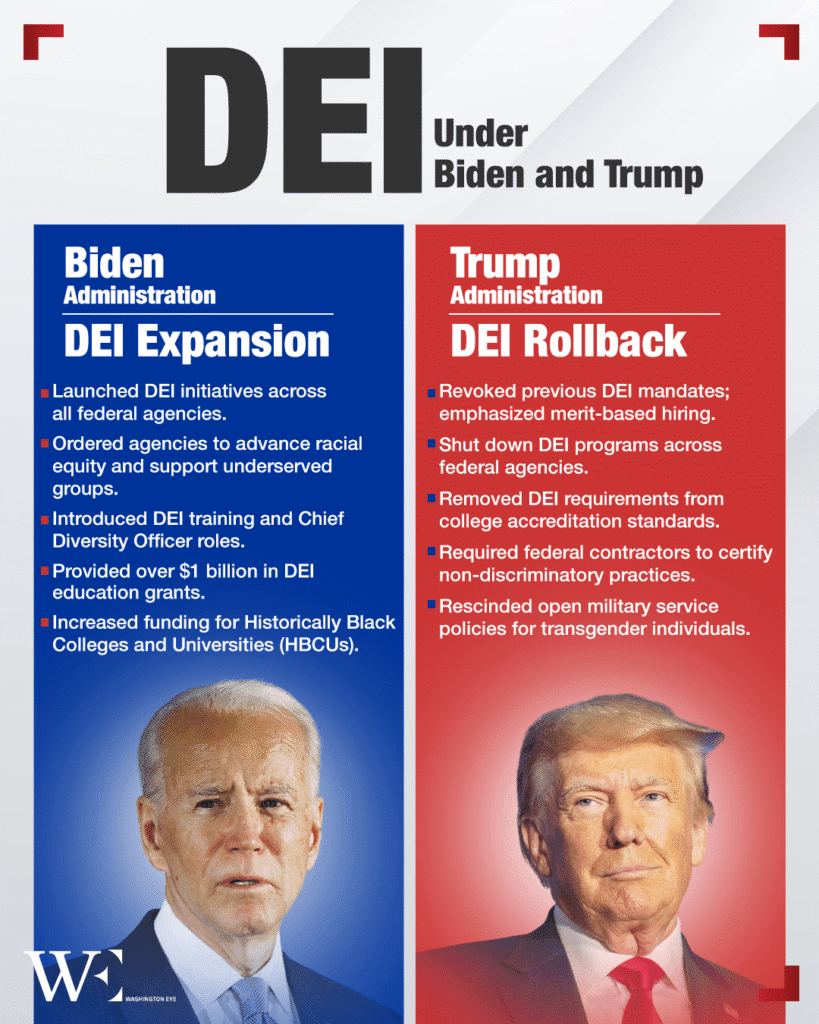In recent months, the Trump administration has moved decisively to undo a number of Diversity, Equity, and Inclusion (DEI) initiatives introduced under President Biden. These changes include rescinding executive orders, redirecting federal funding, and dissolving DEI offices across various government agencies.
The debate over these actions reveals deep divisions in American society over how best to achieve fairness and opportunity. Understanding the contours of this debate is essential for charting a path forward.
The Expansion of DEI Under Biden
During President Biden’s administration, DEI became a prominent focus across federal agencies, universities, and corporate America. Initiatives ranged from mandatory DEI training programs to grant programs aimed at increasing representation among historically marginalized groups.
Supporters viewed these efforts as overdue measures to address systemic inequalities. They argued that structural barriers — present in education, employment, healthcare, and other sectors — required intentional intervention to create genuine equal opportunity. Meanwhile, critics voiced growing concerns that DEI efforts risked overemphasizing group identity at the expense of individual merit, potentially fostering resentment and division rather than unity.
The Trump Administration’s Approach
Since returning to the national stage, the Trump team has prioritized rolling back DEI programs. The administration has revoked executive orders that mandated DEI-related training across federal agencies, defunded research grants and programs specifically designed to promote DEI outcomes, and dissolved or restructured agency offices focused on DEI.
These moves are framed by the administration as steps toward a “colorblind governance” model, where race, gender, and other identity categories are deemphasized in decision-making. Supporters of this approach argue that restoring merit and neutrality within federal institutions is crucial to rebuilding public trust.
Arguments in Favor of Defunding DEI
Proponents of the rollback present several key arguments. First, they contend that the emphasis on group identity undermines meritocracy. They argue that while intentions may be good, promoting individuals based on race, gender, or other identity markers, rather than qualifications and achievement, risks eroding confidence in public institutions.
Second, concerns about bureaucratic expansion are often cited. The growth of DEI offices, task forces, and administrative layers, critics argue, diverts public resources toward initiatives that are difficult to measure and often lack clear accountability.
Finally, many argue that focusing so heavily on identity categories can exacerbate social division rather than healing it. In their view, a return to emphasizing common citizenship and shared civic values would foster greater cohesion and unity, rather than encouraging tribalism based on race, gender, or other classifications.
Arguments Against Defunding DEI
Opponents of the rollback make an equally compelling case. They argue that addressing systemic inequities requires more than neutrality; it requires proactive measures to dismantle longstanding barriers. Simply treating everyone the same today, they contend, does not account for the historical disadvantages that continue to shape disparities in education, wealth, and opportunity.
Moreover, supporters of DEI initiatives often argue that inclusive practices do not dilute excellence but enhance it. They point to research suggesting that diverse teams are more innovative, resilient, and adaptable, thereby strengthening institutions rather than weakening them.
Lastly, many view DEI programs as both a symbolic and substantive commitment to building a fairer society. Rolling them back, they argue, risks sending the wrong message — that inclusion, equity, and representation are secondary priorities rather than essential American values.
What Lies Ahead
The Trump administration’s actions raise important questions about the future of DEI efforts in America. One central challenge is whether institutions can find ways to promote diversity and inclusion without generating concerns about fairness and merit. Another is whether new models can emerge that reconcile the competing visions of equality — between equal treatment and equitable outcomes — that underpin the current debate.
It remains to be seen how much of the DEI rollback will endure, particularly given legal challenges and shifting political dynamics. Lawsuits challenging the rollback of DEI programs are already underway, and the broader public conversation about race, identity, and fairness continues to evolve.
Ultimately, the debate over DEI is not simply about administrative structures or political tactics. It is about how America defines fairness, opportunity, and unity in an increasingly diverse society. Navigating these questions with thoughtfulness and nuance — rather than ideological fervor — will be critical if the country is to move beyond polarization and toward a more genuinely inclusive society.














